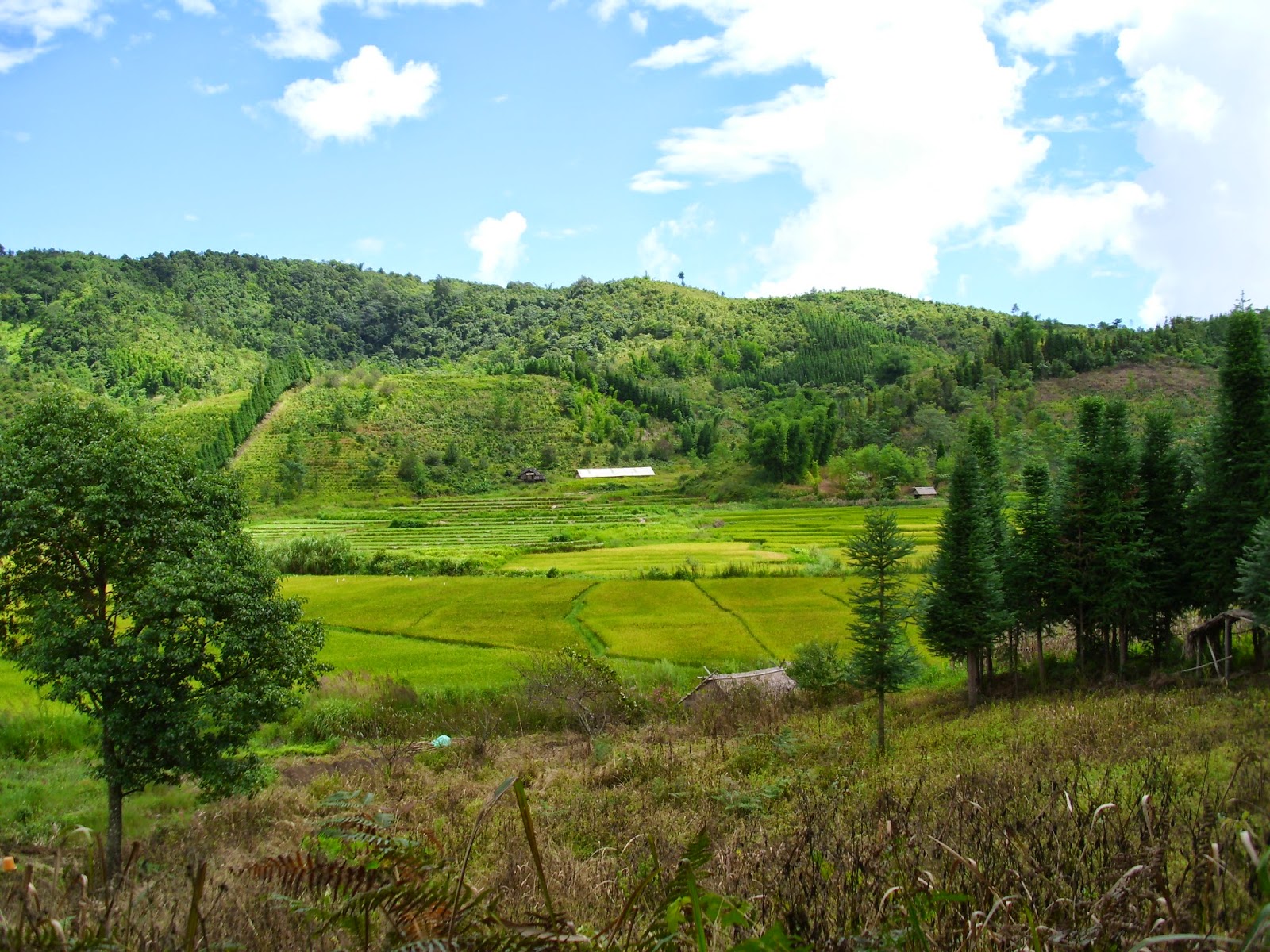In my last
post, I talked about the importance of a good soil structure for having a high
fertility. Another very important factor is the percentage of organic matter
present in your soil.
Organic
matter is essentially made of carbon, the atom that defines life. Carbon is the
basic unit of all living things, from bacteria to humans. As Antoine Lavoisier
said: “in Nature, nothing is created, nothing is lost, everything is
transformed”. I’m going to talk about
the fate carbon and why it matters in agriculture.
 |
| A diverse landscape in Mengsong, Xishuangbanna, Yunnan. |
When the
leaves fall off the trees, they accumulate on the ground and for litter. After a while, the action of
small animals, fungi and bacteria will transform the litter in humus: a dark material made of
unrecognizable remnants of leaves, dead microorganisms and animal feces (yes,
you’re walking on poo every day!). The difference between humus and litter is
the stage of decay at which they are, but the limit is not very clear.
Litter is organic
matter which is being eaten by microorganisms, it is transforming, typically
the colorful fallen leaves cover that you can see in the forests during Autumn.
Litter is the main source of food for the soil animals and microorganisms. Worms
feed on litter, their presence in the soil will guarantee a good soil structure
because they spend their life digging tunnels. They eat litter and digest it
into smaller particles. Nematodes are very tiny round worms, barely noticeable
with the naked eye, they will continue the job and eat smaller pieces. Fungi
and bacteria eventually degrade organic matter into humus.
 |
| Jingmai Ancient Tea Gardens have a thick litter thanks to the big trees. |
Humus is organic
matter that has reached its final stage of decay, it is almost as stable as
stone, it is what’s left after microorganisms have eaten everything. Humus
mixes with the soil particles (sand, silt and clay), this is what makes your
soil more or less dark. It is important
to have a lot of organic matter in the soil because it increases the water and
nutrients capacity of the soil, the fridge is bigger!
Not only
the fridge gets bigger as humus is produced, but it is also steadily filled. If
organic matter is mostly made of carbon, it also contains nutrients very useful
for the plants: nitrogen, phosphorus, potassium, magnesium, calcium… It works
as if you were demolishing a house: you couldn’t reuse the concrete, but you
could recycle the copper from your electric wires and use it in a new house.
Nature works the same, as matter decays, nutrients are made available to the
plants.
 |
| The soil in Jingmai has a dark color, it is rich in organic matter. |
Chemical
fertilizers are very handy for the farmers because they are much lighter than
organic manure, you need to add up to a hundred times less of for the same
amount of nutrients. This is one of the main reasons why they are widely used
in the world, from large scale industrial farms to smallholders who don’t have
a tractor. They have been the cornerstone of the Green Revolution.
However, their
use on the long term creates a major problem: soil degradation. A soil is
always degraded because of rain, wind and chemical processes. In order to
compensate the losses, you have to continuously add things; this is especially
true when it comes to organic matter. After several years without adding
organic matter, the soil structure is impacted; it is more vulnerable to
weathering and has poorer nutrient and water retention capacity. In other
words, you have plenty of food, but your fridge is very small…
Très intéressant William on sait que les engrais chimiques sont pas bon mais pourquoi c'est une autre histoire. C'est très instructif à la portée de tous.
ReplyDeleteTrès intéressant William on sait que les engrais chimiques sont pas bon mais pourquoi c'est une autre histoire. C'est très instructif à la portée de tous.
ReplyDeleteMerci Eric, je suis heureux que cette article te plaise!
ReplyDeleteGood review, btw, do you want to add your posts here? http://tea-weekly.com
ReplyDelete